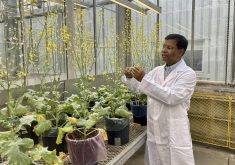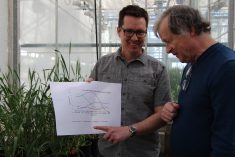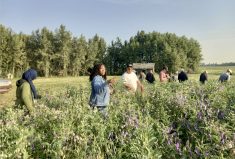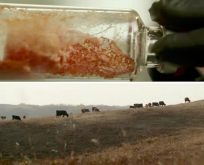Further cuts to post-secondary institutions could lead to the “canola-ization” of wheat breeding. And that’s not a good thing, says one of the country’s top wheat breeders.
“I think farmers would say the canola experience is a mistake — letting private enterprise take it over,” said University of Alberta professor, Dean Spaner.
“Effectively, they’re breeding to make profit. We’re breeding to improve crop production for farmers.”
Since 2013, the University of Alberta’s wheat-breeding program has developed 14 new wheat varieties for western Canadian farmers, including popular ones such as CS Tracker, CS Jake, and Parata. Breeding varieties suited for the northern Prairies is a key focus of the program.
It’s a dramatic turnaround from when Spaner arrived in Edmonton two decades ago and worked with his colleagues to cobble together funding for anything above and beyond the bare necessities.
“When I started, we didn’t even have a combine. We didn’t have a truck,” said Spaner. “But we did have a land base.”

Funds from the Western Grains Research Foundation’s now-defunct Western Canadian Deduction checkoff and grants from the (also defunct) Agriculture Crop Industry Development Fund were critical to getting the wheat-breeding effort off the ground.
“To get a viable breeding program, I had to have 10 grants from the get-go,” he said, adding he usually has about a dozen grants at any given time in order to keep the program operating.
“I can be Pollyanna about it and say, ‘I’m all right.’ But that’s after two decades of fighting for money. It’s been a struggle to get funding to adequately fund the program.”
But as time went on and new lines were released, organizations like Alberta Wheat also started to fund this breeding work. In May, the farm group and its Prairie cousins pledged $2 million over five years for the program. The goal is to breed “field-ready cultivars” resistant to diseases such as stripe rust and fusarium head blight while at the same time delivering better yield, earlier maturity, and strong straw — “all of which are key priorities of northern Alberta’s Parkland region where the program is located,” said a U of Alberta release.
Read Also

Farming Smarter receives financial boost from Alberta government for potato research
Farming Smarter near Lethbridge got a boost to its research equipment, thanks to the Alberta government’s increase in funding for research associations.
“The commissions have given us reasonably large grants, which we try to match with government funding, and that’s kept us going to the point where we’ve been averaging about a million dollars a year for the last five years and going on for the next five years,” said Spaner.
And that level of funding is enough to work with for a public breeding program with very little overhead, he added.
“Having a million-dollar-a-year program is substantial, even in the modern world. When you only have $500,000 a year, you don’t have a viable breeding program.”
But recent provincial government cuts to the University of Alberta — including a $44-million reduction in its operating grant — could strip these breeders of the only real resource they had when they started out: their land.
“The cuts to the university that this provincial government has done has effectively decimated much of the infrastructure at the university, both physical and human infrastructure,” said Spaner.
“With the cuts to the university, they say we’re going to be losing one of our major land resources, and that will seriously affect the program badly. We’re effectively now running up to the limit of the land base because of the university being cut so heavily.
“The cuts to the university have been catastrophic.”
And it’s not just the university may have to sell off some land, it’s also laying off staff in droves.
“The university itself is suffering 33 per cent job loss,” he said. “It’s brutal. The morale on campus is awful.”
Right now, all of the workers in Spaner’s breeding program are funded through grants, but in the past, lost grants have meant layoffs for the team.
“When we lose a grant like we did four years ago, I laid off four people, one of whom is an internationally renowned scientist,” said Spaner. “I laid off a woman who was with me for seven years because I couldn’t afford to keep her.”
And with increased competition for dwindling research dollars across the country, more targeted investment in public breeding programs like his will be needed, he said.
“The real problems I see are the attacks on the education system,” said Spaner. “We are the last vestiges of publicly funded breeding in the world. Europe quit doing that — it turned it all over to private enterprises, and that’s a very scary prospect.
“The example is right in our faces — the ‘canola-ization’ of breeding, which is effectively the privatization of seed.”















